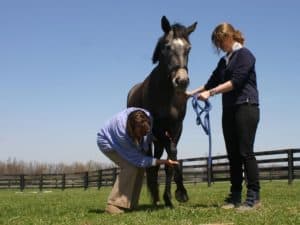
Is My Horse Neurologic or Lame?
Gait-altering conditions such as EPM, wobbler syndrome, and Lyme disease can be tricky to spot and even more difficult to diagnose.

Gait-altering conditions such as EPM, wobbler syndrome, and Lyme disease can be tricky to spot and even more difficult to diagnose.

Find out what a veterinarian might look for when examining a horse that loses his balance after jumping a fence.

A poor outcome for a horse with EPM demonstrates the complexity of this neurologic disease. Read more in this article from The Horse‘s Summer 2023 issue.

Implementing these rehabilitation strategies might help improve your horse’s prognosis after a neurologic diagnosis.

A slow, steady, step-by-step approach helps veterinarians localize lesions in neurologic adult horses. Read more in the Fall 2023 issue of The Horse.

These difficult-to-diagnose conditions can undermine a horse’s balance and coordination.

The decision about riding horses recovering from EPM and other diseases, one vet says, involves balancing rider safety, liability concerns, and animal welfare.

Equine protozoal myeloencephalitis is a progressive and potentially fatal neurologic disease in horses caused by protozoal microorganisms, most commonly S. neurona. Sponsored by Marquis.

A veterinarian explains why antiprotozoals are unlikely to cause resistance among the protozoan parasites that cause EPM in horses.

With proper treatment and rehabilitation, horses with neurologic conditions such as EPM and EHM can recover and live happy and healthy lives.

Cervical vertebral malformation and EPM can cause neurologic disease in horses at the same time.

Pathologists detected S. neurona DNA in preserved tissue from horses with acute and chronic neurologic disease, with and without EPM treatment history.

Once-weekly Protazil administration achieved steady-state plasma concentrations known to inhibit S. neurona, which causes EPM in horses.

Performing a serum:cerebrospinal fluid titer ratio to confirm/rule out EPM in horses (versus treating without that test) substantially decreased cost for the owner.

Dr. Sarah Colmer shares how EPM recovery might vary among horses based on the severity of the disease.

EPM can be difficult to diagnose. Dr. Sarah Colmer explains how veterinarians use a neuro exam, bloodwork, and cerebrospinal fluid to confirm an EPM diagnosis.
Stay on top of the most recent Horse Health news with
© 2022 Copyright Statement dolor sit amet, consetetur sadipscing User Terms, sed diam nonumy eirmod tempor invidunt ut labore et dolore magna aliquyam erat, sed diam voluptua. At vero eos et accusam et justo duo dolores et ea rebum. Stet clita kasd gubergren, no sea takimata sanctus est Lorem ipsum dolor sit amet.
"*" indicates required fields